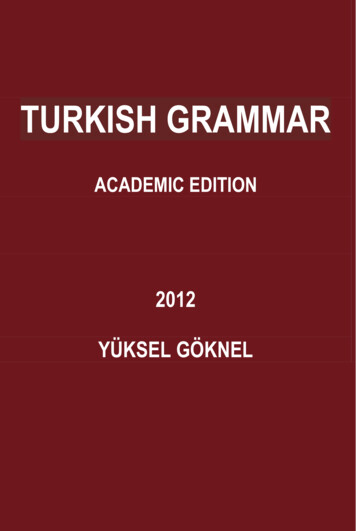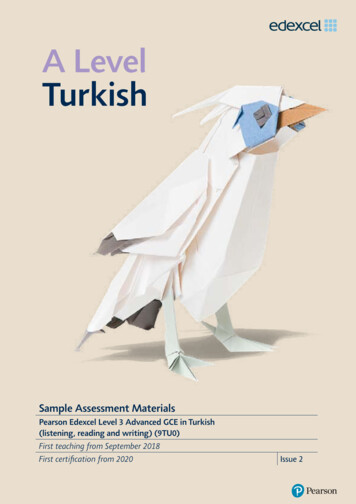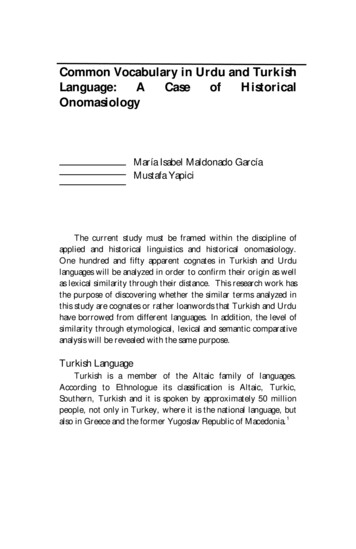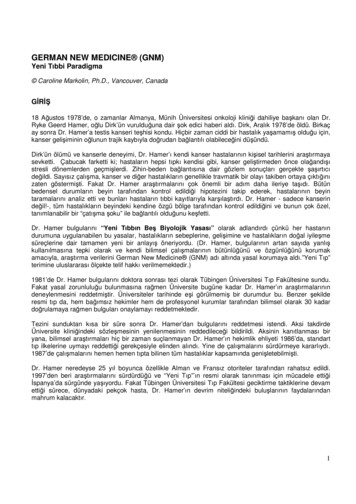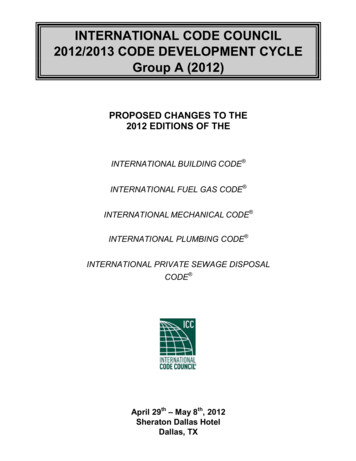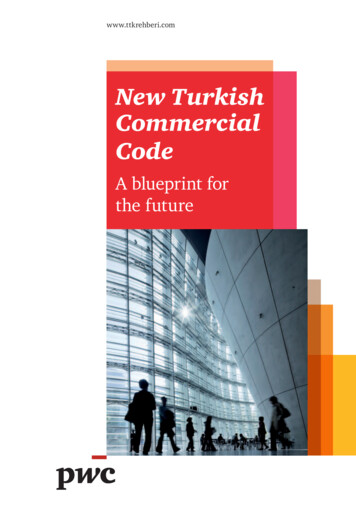
Transcription
www.ttkrehberi.comNew TurkishCommercialCodeA blueprint forthe future
New Turkish Commercial CodeA blueprint for the futureContentsA Future Unique to a Civilised Society2Competition in a World without Boundaries4Effective Date of New Turkish Commercial Code6I. Common Concepts related to Corporate Law7A. Corporate governance9B. Web site, information society services and access rights of capital stock companies10C. Single-shareholder joint stock company (A.Ş.) and single-member limited liabilitycompany (L.Ş.)10D. Group of companies12E. Structural changes in companies15F. Reforms for commercial books in conformity with Turkish Accounting Standards(identical to IFRS)20G. Audit in equity capital companies23H. The new regulation to enable payments for supply of goods and services on time and theconsequences of late payments28II. Joint Stock Company31A. Establishment of an A.Ş.33B. Closed A.Ş., publicly held A.Ş. and publicly traded A.Ş.34C. Capital and shares in an A.Ş.35D. A.Ş. acquisition of its own shares or acceptance thereof as pledge37E. Board of Directors (“BoD”)39F. General Assembly (GA)43G. Capital increase44H. Liability46I.Termination and liquidation50III. Limited Liability Companies51A. Main features of new limited liability company structure53B. Incorporation and legal status of L.Ş.55C. Strengthening of economic structure of Company, its financial position55IV. Secondary Regulations57Related Articles61A. Related articles of Turkish Commercial Code No. 610263B. Code on effectiveness and enforcement of Turkish Commercial Code Law No. 6103137
A Future Unique to a CivilisedSocietyProf. Dr. Ünal TekinalpChairmanDraft Turkish CommercialCode Commission2 PwCThis handbook aims to illustratethe modern evolution, importantinnovations, and reformist approachesof the new Turkish Commercial Code(“New Law”), and to provide details ofthe law by which Turkish commercial,financial and capital markets will bebound. There is no single, identicalfuture for every individual or everysociety. Each country defines its ownfuture. Turkey needs to choose its ownpath to a modern and socially awarefuture. If we choose wisely we canraise both our country’s profile and ourpeople’s spirits. In order to do this, youhave to pay a price, but the price is farless than that paid by a society that failsto keep pace with the realities of thenew understanding of commerce.The New Law regulates commercialenterprises, commercial companies,negotiable instruments, transportationoperations, maritime law and insurancecontracts. Based on the “commerciallaw understanding” handed downfrom the 1926 and 1956 commercialcodes, the New Law aims to radicallychange the future of commercial law.The New Law doesn’t just integrateTurkish commercial law with EuropeanUnion law or create an infrastructurebased on Basel II, transparency and aninformation society; it simultaneously
puts into effect generally acceptedfinancial reporting and auditingprinciples and paves the way fordemocracy among shareholders and theuse of information technology tools.The goals of the New Law are toestablish and sustain a system ofcommerce, industry and servicesupply at a consistently high level; toprovide justice; to protect society andsafeguard its ethical values, and to focuson modern traders and companies,investors, transporters, the insured andsmall and medium-sized enterprises(SMEs) – all areas in which competitiveenterprises shape our economicenvironment and where the language ofinternational markets is spoken.Principles of corporate governancehave moved beyond publicly tradedcompanies and have becomemanagement best practices, withconsequences for all private and publicoperations. The principles also providean effective codex for internal andexternal audit. All this is acknowledgedin the New Law and highlighted in thishandbook.I would like to acknowledge thecontributions of Bige Tekinalp, whoprepared this book for publication withgreat care. She listened to lectures Igave at more than 100 seminars, panelsand meetings, examined their texts,provided commentary on the law andhas ensured that this book includes allof the New Law’s underlying principles,critical points and new concepts.I would also like to thank PwCTurkey. By publishing the New Law’sarticles on commercial enterprisesand capital stock companies in theirfinal accepted form, PwC has helpintroduce the public to the law in allits richness. This publication allowsthe goals and purposes of the DraftTurkish Commercial Code Commissionto be explained to non-governmentalorganisations and relevant stakeholdersin the New Law. This publication hasallowed the Commission to reach theorganisations and corporations withwhich we discussed the New Law, andit has enabled us to bring the New Law,the fruit of a collective endeavour, to thetarget audience.New Turkish Commercial Code - A blueprint for the future3
Competition in a Worldwithout BoundariesCansen Başaran SymesTerritory Senior Partner,PwC TurkeyA new world balance is emerging,one in which boundaries have beenremoved by the global economy andinternational commerce. By 2050 thesize and roles of national economiesin the global economy will havechanged dramatically. The extent towhich Turkey can to make the bestuse of the opportunities ahead willlargely determine how much influenceit obtains in the economic and globalarena of the future. In an era of change,the new Turkish Commercial Code(“New Law”) will leave its mark oncommercial life in Turkey. It truly is ablueprint for the future.The New Law was prepared after apainstaking five-year study by thePreparatory Commission for the DraftTurkish Commercial Code, underthe chairmanship of Prof. Dr. ÜnalTekinalp. In addition to the opinions andviewpoints of academics, professionalorganisations and nongovernmentalorganisations received during thepreparation period, the opinionsof leading Turkish companies weresought before the draft was presentedto the Turkish Parliament. During itsdevelopment, the New Law receivedsupport from all political circles, tradeunions, non-governmental organisationsand professional unions; its enactmentwas the product of unprecedented socialand political consensus.4 PwC
In the wake of the recent downturn,the global economy is settling at anew balance point. For nations andcompanies to enhance their competitivestrength, their rules must be compatiblewith global standards. Globalcompetition has put added emphasison corporate growth and developmentpotential, corporate governance, publicconfidence, high-quality financialinformation and transparency.The New Law redefines the rulesgoverning commercial life in Turkey,with a modern approach that will helptake Turkey to the next level in terms oftransparency, auditability and reliability.Turkish business life continues toevolve rapidly, and its adoption of moretransparent principles of corporategovernance will increase the globalcompetitive strength of Turkishenterprises.The New Law makes Turkish tradelegislation compatible with the EUacquis communautaire – the legislationthat candidate countries must adopt tobecome EU members – removing a majorobstacle to Turkey’s accession to the EU.The more quickly the New Law takesforce, the sooner the desired benefitscan be obtained. The implementationof supporting regulations for the Codeof Obligations and the New Law areessential. Turkey still has much to doand no time to waste. It is time forTurkey to become creative and moveforward. The New Law creates anenvironment for all these developments.Objections to the law should not beblown out of proportion or allowedto further delay its effective date. Allparties will certainly benefit fromtransparency and auditability. Webelieve the ethical and transparentstructures the New Law introduces willhelp commercial life to thrive and willaccelerate Turkey’s development. It istime for our companies, investors andentrepreneurs to choose: they musteither help lead the change or drop outof the race.PwC Turkey prepared this summary onthe major changes in the New Law’ssection on commercial companies withthe invaluable efforts of Bige Tekinalp.We are proud of our contributions, butthe work is far from over, and we areready to do our part. PwC Turkey willcontinue to support and add value to thebusiness life on all topics relating to theNew Law.New Turkish Commercial Code - A blueprint for the future5
Effective Date of NewTurkish Commercial CodeThe New Law was promulgated in the Official Gazette on 14 February2011. As stated in the New Turkish Commercial Code No. 6102 and LawNo. 6103 on Validity and Application of the Turkish Commercial Code, theNew Law will become effective on 1 July 2012, excluding two groups ofprovisions.a) The first group comprises provisions relating to Internet sites tobe opened by capital stock partnerships for information services.Information on capital stock companies of interest to shareholders,partners, employees, suppliers, creditors and investors will beavailable on these Web sites. Provisions relating to this mechanismwill be applicable as of 1 July 2013.b) The second group comprises provisions that require the audit ofcapital stock companies to be made in accordance with TurkishAuditing Standards, which are in line with International Standardson Auditing and financial reporting standards. Regulations onfinancial reporting require tradesmen and enterprises to be subjectto Turkish Accounting Standards (TAS) in line with InternationalFinancial Reporting Standards (IFRS), effective 1 January 2013.6 Common Concepts related to Corporate Law
I. Common Concepts Relatedto Corporate LawNew Turkish Commercial Code - A blueprint for the future
A. Corporate GovernanceCorporate governance is the dominant concept in the New Turkish Commercial Code(“New Law”). No longer does corporate governance mean a system of rules applicable onlyto publicly traded companies; it is a principle that should be applied to all enterprises. Itaims to inspire investor confidence and ensure sustainable development. The New Lawintroduces material provisions regarding good management and internal and independentaudit that are to be applied to all capital stock companies. Thus the New Law will embedin Turkish law, simply and understandably, the concept of corporate governance – whichhas become common in recent years around the world and has grown in complexity,reflecting differences in the economic, financial, political and cultural structures of thecountries applying it. The regulation of corporate governance under the New Law can besummarised as follows:1.The corporate governance approach of the New Law is based on four pillars thathave universal characteristics within the context of corporate governance. (1) fulltransparency, (2) fairness, (3) accountability, (4) responsibility.2.Full transparency has been sought in (1) financial statements, (2) boards of directors’(BoD) annual reports, (3) independent audits, (4) transactional auditors, (5) all auditreports of individual companies and group of companies.3.Fairness has been ensured by establishing a balance of interests and by objectivejustice.4.Accountability has been embodied in the BoD reports, flow of information, right toinformation and oversight.5.Responsibility has been regulated in parallel with accountability.6.The rights of shareholders to sue, obtain information and perform oversight havebeen created along with smooth-running legal mechanisms.7.The minority rights list has been expanded.8.Privileged shares have been restricted.9.Representation opportunities for group of shareholders and the minority in the BoD,have been increased.10. The Capital Markets Board (CMB) has been provided with exclusive authority toregulate corporate governance. This authorisation will ensure it remains dynamic andup-to-date.11. The BoDs of publicly held companies are now obliged to publish corporategovernance reports.12. Professionalism and specialisation in bodies has been emphasised.New Turkish Commercial Code - A blueprint for the future9
B. Web Site, Information Society Services and Access Rights ofCapital Stock CompaniesUnder the New Law, all capital stock companies are obliged to create a Web site; if thecompany already has a Web site, it must allocate part for “information society” servicesThe New Law defines “information society” as a society with access to information. Thefollowing conditions apply to company Web sites:1. a. all data that is relevant to the company and in which shareholders, minorities,creditors and stakeholders have an interestb. documents and calls regarding General Assembly (GA) meetingsc. year-end and interim financial statements and merger and division balance sheetsd. audit reports (reports of auditor, operational auditor, special auditor, etc.)e. valuation reportsf. offers for exercising pre-emptive rightg. announcements related to liquidationh. announcements related to action for cancellation2. Access to the Web site shall be available to everyone and shall be unrestricted, toensure the right to and possibility of access.3. The Web site shall provide the means for electronic GA and BoD meetings and forelectronic voting.4. The Web site is a complete, visual and electronic trade log.5. The Web site has introduced the concept of stakeholder into Turkish law.6. The content uploaded on the Web site is kept there for at least six months from theupload date, or it is deemed not to have been uploaded. For financial statements, thisperiod is five years. Although the New Law will be effective as of 1 July 2012, Article1524 regulating Web sites shall be effective as of 1 July 2013.C. Single-Shareholder Joint Stock Company (A.Ş.) andSingle-Member Limited Liability Company (L.Ş.)In GeneralThe New Law introduces one other significant innovation that satisfies a major need:single-shareholder A.Ş. and single-member L.Ş. This “one-man company” has beenregulated by means of adapting the Twelfth Council Company Law Directive (89/667/EEC) from EU law to Turkish law.10 Common Concepts related to Corporate Law
Single-shareholder A.Ş. and single-member L.Ş. can be incorporated; in addition, ifthe shareholders/partners of an A.Ş. or a L.Ş. incorporated by and among multipleshareholders/partners drops to a single partner or shareholder, the firm can legallycontinue its activities. If a company is incorporated with a single person, the legal form of the company,the name of the single person, trade name and address will be registered with theTrade Registry and announced. If a company is incorporated by and among multiple shareholders or partnersand the number of shareholders/partners drops to one, for reasons such asshare transfer, withdrawal or dismissal of shareholders/partners, the companycan continue to carry out its business in the same manner and maintain its legalpersonality. This is a direct change from the current Turkish Commercial Code(Code), under which an action for dissolution must be initiated. This situationwill be immediately registered with the Trade Registry and announced, and theinformation regarding the identity of the person who has become the singleshareholder/partner will be registered. If a company fails to make this introductory and explanatory announcement (arequirement of the principles of transparency and public disclosure), the BoD andthe single shareholder/partner – even the other party to the transaction that putthe company in such situation – can be held responsible. The single shareholder or partner can solely use all powers of the GA and can adoptall resolutions. However, all resolutions adopted in the name of the GA must bespecified as GA resolutions and must be made in writing. The single shareholder/partner can conduct a transaction with itself in writing.The same rule is also applicable to transactions between the representatives of asingle-partner or a single-shareholder company, and the single shareholder/partnerhimself or the company. The said rule will not apply to operations considered dayto-day transactions.Doesn’t a one-man company contradict the concept of ‘company’?A one-man company does not contradict the concept of “company”. A company is notnecessarily a union of people with more than one partner, but an operational organisationthat manufactures and supplies goods and services. A company is the name given to anenterprise that functions for the purpose of realisation of its scope of activity. Accordingly,the company can consist of a single shareholder or a single partner; however, it canalso have a BoD consisting of 10 to 15 members, various audit committees and severalcommissions, in line with the principles of corporate governance. The important thing isthe appropriateness of the structure for the scope of the activity; best management andaudit practices are essential.The elements that define a company are the managerial organisation needed to achieveits scope of activity, effective audit, ability to compete, and presence in national andinternational markets. The number of partners is a marginal and insignificant element;New Turkish Commercial Code - A blueprint for the future11
it can be useful when describing a publicly held company or a publicly traded company;however, it does not describe the modern understanding of a company. The number ofshareholders is significant only when the shares of a company are being listed on a stockexchange. This characteristic makes the company a publicly traded company. A singleshareholder A.Ş. can easily be converted into a publicly traded company. It would be anexcessively formalist approach not to consider an organisation with such flexibility as acompany, simply because it has a single shareholder or partner.Legal systems that do not permit single-shareholder A.Ş. or single-member L.Ş. eliminatedthe possibility for associations, foundations, unions and universities to incorporatecompanies related to their operations.A single-shareholder or partner company responds to the followingneeds:1. It provides the opportunity for the owner of an enterprise who wishes to convertits single proprietorship to a new legal type of limited liability company, i.e., for anA.Ş. or a L.Ş. to incorporate a one-man company. Thus, the owner will no longer beforced to add token individuals into the company for its incorporation.2. When a foundation, association or university wants to incorporate a company, itmight naturally be the single partner or shareholder of such a company. Taking ontoken shareholders or partners into the company along with the actual partner israrely well-suited to these organisations’ purposes.3. If an A.Ş. or a L.Ş. wants to establish a vendor related to its own scope of operation,it can establish such vendor on its own through a new company. For example, ifa company that manufactures refrigerators wants to incorporate a company thatproduces plastic refrigerator shelves, it would no longer have to take on a partnerunnecessarily.4. As single-shareholder or partner companies are very common in Europeancountries, companies that want to invest in Turkey can make their investmentsdirectly as a single shareholder or partner by themselves.D. Group of CompaniesIn GeneralA group of companies (“Group”) which is created for the specific purpose of managingmore than one capital stock company, according to predetermined and concrete policieswithin the context of controlling relationships, has been regulated for the first time inTurkish law by the New Law. A group of companies is known as a “corporate group” inAnglo-American communities and in German law as a “Konzern”.A significant loophole in the law has been closed and a significant need has been satisfiedthrough this new regulation. By means of these provisions:12 Common Concepts related to Corporate Law
The concepts of a controlling (parent) company, which sustains control, anda dependent company (subsidiary), which is under control, have been clearlydefined, and the
Effective Date of New Turkish Commercial Code 6 I. Common Concepts related to Corporate Law 7 A. Corporate governance 9 B. Web site, information society services and access rights of capital stock companies 10 C. Single-shareholder joint stock company (A.Ş.) and single-member limited liability company (L.Ş.) 10 D. Group of companies 12File Size: 2MB


